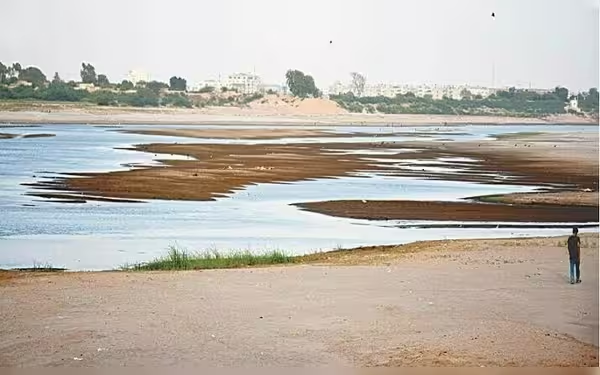Saturday, November 16, 2024 10:34 PM
Balochistan And Sindh Unite For Increased Water Share From Punjab
- Balochistan allies with Sindh for water rights.
- Sindh criticizes current water distribution formula.
- Irsa faces resistance from Punjab on water-sharing proposal.
 Image Credits: dawn
Image Credits: dawnBalochistan and Sindh unite to demand a larger water share from Punjab, challenging the current distribution framework.
In a significant shift in water-sharing dynamics, Balochistan has allied with Sindh to advocate for a larger share of water from Punjab. This collaboration marks a departure from Balochistan's previous stance of opposition, as both provinces now seek to implement a provincial water distribution mechanism that has been dormant for over twenty years. The recent meeting of the Indus River System Authority (Irsa) Advisory Committee (IAC) highlighted the urgency of addressing water distribution issues that have long plagued these provinces.
During the IAC meeting, Sindh's irrigation secretary, Zarif Khero, emphasized the need to revert to the original water distribution framework outlined in Para-2 of the Water Apportionment Accord of 1991. He criticized the current 3-tier formula, which was adopted by Irsa to manage water shortages, arguing that it has unjustly deprived Sindh of its rightful water share. Khero expressed frustration over the prolonged delay in decision-making, stating that Sindh has been given a "lollipop" of promises regarding future resolutions, yet the matter remains unresolved.
In a surprising turn of events, Irsa Chairman Abdul Hameed Mengal, who represents Balochistan, voiced his support for Sindh's position. He acknowledged that Balochistan's interests align with those of Sindh, as the application of Para-2 would not only benefit Sindh but also enhance water availability for Balochistan. This newfound unity between the two provinces is particularly noteworthy, given Balochistan's historical grievances against Sindh regarding water flow and compensation for water consumption.
However, the proposal to shift back to the Para-2 framework faced resistance from Punjab and federal representatives, who cited technical grounds for blocking the move. They argued that the matter is still pending with the Council of Common Interests (CCI) and that Irsa, as a subordinate body, cannot unilaterally make decisions without a complete five-member panel, which currently lacks representation from Khyber Pakhtunkhwa.
The discussion became contentious, with Punjab members suggesting that Sindh's high system losses contribute to the ongoing disputes. In response, Sindh representatives pointed out that improvements in Punjab's water management could also alleviate the situation. The ongoing water crisis has led to a reliance on the 3-tier formula, which was initially designed for scenarios of sufficient water availability. However, with chronic shortages now exceeding 10%, this formula has become a source of dissatisfaction for Sindh.
Irsa has maintained that it cannot alter the current distribution practices, which have been in place since 2002, despite Sindh's objections. The 3-tier formula combines elements from the original accord and historical usage, but it has disproportionately affected smaller provinces like Balochistan and Khyber Pakhtunkhwa, leaving Sindh to bear the brunt of water shortages.
As the debate continues, it is clear that the water-sharing issue is not just a technical matter but a complex interplay of political interests and historical grievances. The collaboration between Balochistan and Sindh could signal a new era of cooperation in addressing water scarcity, but it also highlights the urgent need for a comprehensive and fair resolution to the longstanding disputes over water distribution in Pakistan. The future of water management in the region hinges on the ability of these provinces to work together and advocate for their rights, ensuring that all parties receive their fair share of this vital resource.













